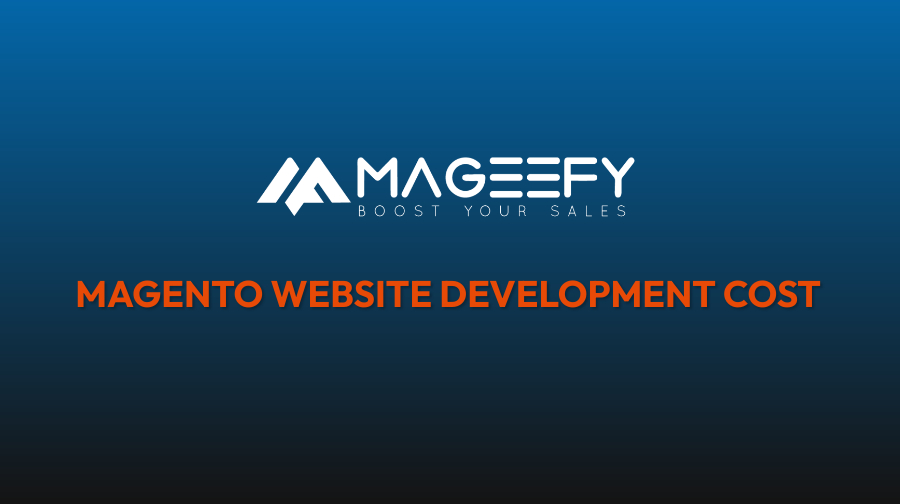
The cost of a Magento eCommerce website can vary depending on several factors such as the size of the website, the complexity of the design, the number of products, and the features and functionalities required. Here is a breakdown of the different costs associated with building a Magento eCommerce website:
- Magento Platform Costs: Magento offers two editions - Community and Enterprise. The Community edition is free, but it may not include all the features that you need. The Enterprise edition requires a license fee, and its cost varies depending on the size of the website and the features required.
- Development Costs: The development cost includes the cost of hiring a web developer or an agency to build the website. The cost can vary depending on the complexity of the design and the number of features required.
- Design Costs: The design cost includes the cost of hiring a designer to create the website's layout and visual elements such as logos, banners, and images. The cost can vary depending on the designer's experience and the complexity of the design.
- Hosting Costs: Hosting is the cost of renting a server to host your website. The cost can vary depending on the hosting provider and the size of the website.
- Maintenance and Support Costs: Maintenance and support costs include the cost of ongoing website maintenance, security updates, and technical support.
Based on these factors, the cost of a Magento eCommerce website can range from a few $1000 to $10000. It is essential to define your requirements and get a quote from a web development agency to get a better estimate of the cost.
Magento is a popular e-commerce platform that is widely used for building online stores. Here are some features of a Magento website:
- User-Friendly Interface: Magento has an intuitive and user-friendly interface that makes it easy for customers to navigate the website and find what they are looking for.
- Mobile Responsiveness: Magento websites are mobile-responsive, meaning they can be accessed and used seamlessly on any device, including smartphones and tablets.
- Customizable Design: Magento offers a range of customizable templates and themes that allow businesses to create unique and visually appealing websites that align with their brand.
- Multi-Store Functionality: Magento allows businesses to create and manage multiple online stores from a single admin panel, making it easy to manage different stores and product catalogs.
- Advanced Search Functionality: Magento has an advanced search functionality that allows customers to easily find products based on their search criteria, such as category, price range, color, and more.
- SEO-Friendly: Magento is SEO-friendly and comes with built-in SEO tools that help improve the website's visibility and ranking on search engines like Google.
- Integration with Third-Party Applications: Magento can be easily integrated with a range of third-party applications, including payment gateways, shipping providers, and marketing tools, making it easy to manage various aspects of the business.
- Scalability: Magento is a highly scalable platform, making it suitable for businesses of all sizes, from small startups to large enterprises.
- Robust Security: Magento comes with robust security features, including SSL encryption, two-factor authentication, and security patches, ensuring that the website and customer data are secure.
- Analytics and Reporting: Magento provides businesses with advanced analytics and reporting tools that help track website performance, customer behavior, and sales data, allowing businesses to make data-driven decisions.
In terms of a theme-based website, the cost may be lower than a completely custom website, as there is less design work involved. However, there may still be customization required to make the website unique and tailored to your brand and business needs.
Generally speaking, a basic theme-based Magento website can cost anywhere from $3,000 to $10,000, while a more complex website with customizations can range from $10,000 to $50,000 or more. It's important to work with a reputable developer who can provide you with a detailed proposal and cost breakdown based on your specific requirements.
The cost of a custom Magento website design can vary greatly depending on the complexity of the project, the level of customization required, and the experience of the web design company you choose to work with.
Generally speaking, the cost of a custom Magento website design can range from $5,000 to $50,000 or more. Factors that can impact the cost include the number of pages and product categories, the complexity of the design and layout, the level of functionality required (such as custom modules or integrations), and the level of customization required for the theme.
It's important to work with a reputable web design company that has experience designing and developing Magento websites. This will ensure that your website is designed and developed to your specifications and that it meets all of your business needs. Additionally, be sure to get a detailed quote and scope of work before starting any project to avoid any unexpected costs or surprises.
Difference between Magento & other ecommerce platforms
Magento is an open-source ecommerce platform that is designed to provide merchants with a flexible, scalable, and customizable solution for creating online stores. Compared to other ecommerce platforms, Magento offers several unique features and benefits, including:
- Flexibility: Magento is highly customizable, which makes it a great choice for businesses with unique requirements or complex product catalogues. It allows merchants to customize everything from the look and feel of their store to the functionality of individual features.
- Scalability: Magento is built to handle large-scale ecommerce operations, making it a good choice for businesses with high volumes of traffic, transactions, and product catalogs.
- Open-source: Magento is an open-source platform, which means that it can be downloaded and used for free. Additionally, the platform has a large community of developers who contribute to its development, which means that there are many third-party extensions and plugins available to enhance its functionality.
- Multi-store support: Magento supports multiple stores, which allows businesses to manage multiple ecommerce sites from a single platform.
- SEO-friendly: Magento is designed with SEO in mind, making it easier for businesses to optimize their online stores for search engines and improve their visibility in search results.
Some other popular ecommerce platforms, such as Shopify and WooCommerce, also offer unique features and benefits. For example, Shopify is known for its ease of use and user-friendly interface, while WooCommerce is a popular choice for businesses that already use WordPress for their website. Ultimately, the best ecommerce platform for a business will depend on its specific needs and requirements.
Connect us with your ecommerce development requirements or you can choose to hire a developer option too.

 Register
Register Sign in
Sign in



